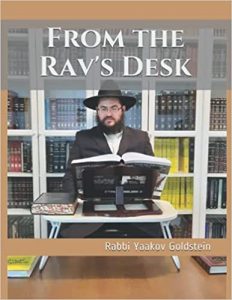

*As an Amazon Associate I earn from qualifying purchases.
Question: [Wednesday, 13th Adar 2, 5782]
I have a Kosher Megillah from which I read along together with the Baal Korei by our shuls Megillah reading. I’m wondering what is the correct thing for me to do regarding the blessings; should I say the blessings to myself or should I be Yotzei with the Baal Korei?
Answer:
While from the letter of the law you may choose to say the blessing yourself if you wish [and say it together with the Baal Korei so you don’t have to make a Hefsek of Amen for his blessing], nonetheless Admur explicitly rules that by a public Megillah reading it is best for you to be Yotzei with the blessings of the Baal Korei, due to Berov Am Hadras Melech. This especially applies if there is a Minyan present. The above applies by both the before and after blessing of the Megillah. Nonetheless, some are particular to recite the blessing themselves rather than be Yotzei with the Chazan, and so was the custom of the Rebbe to say both the before and after blessing to himself. Despite this, some write that the Chabad custom is to always be Yotzei the after blessing with the reader.
Explanation:
Choosing to say a blessing to oneself when one can simply fulfill his obligation with the blessing of another person enters the question as to whether this is considered an unnecessary blessing [Bracha Sheiyno Tzericha]. Practically, regarding this matter we rule that it is not considered an unnecessary blessing as one is personally obligated in the Mitzvah and the blessing, and hence may choose to say it himself if he wishes, and we cannot force him to be Yotzei with a Shliach. Furthermore, there is even an advantage of saying one’s own individual blessing, as it is better to personally say a blessing than be Yotzei through a messenger. Nonetheless, despite this argument, Admur and other Poskim conclude that by Mitzvos which are fulfilled collectively, such as Megillah reading in which one person reads on behalf of everyone else, it is best for everyone to be Yotzei with the blessings of the Baal Korei, due to the advantage of Berov Am Hadras Melech. Now, although it is possible to argue that one who is reading the Megillah to himself from within a Kosher Megillah is not subject to the above ruling that the advantage of Berov Am overrides [as for him it is not a collective Mitzvah], practically, most people who read along from a Kosher Megillah do so as an extra insurance, and are still intending to fulfill their obligation with the Baal Korei, and hence the advantage of Berov Am overrides the advantage of them saying a personal blessing.
Despite the above ruling of Admur, some Poskim rule that it is best for each individual to recite the blessings of Megillah to himself rather than be Yotzei with the Chazan. The reason for this is as perhaps the listener will be unable to concentrate on the blessings due to the long blessing and melody recited by the Chazan. Alternatively, this is because the Chazan may not have proper intent to fulfill one’s obligation. Such a concept is indeed mentioned in Admur regarding the blessings of Lulav and Hallel, in which he writes that due to the above reasons, the custom is for everyone to say the blessing to themselves, despite the advantage of Berov Am. Some Poskim, however, rule that this is limited to one who is reading along in a Kosher Megillah. However, one who is reading along in a Chumash is to be Yotzei with the Chazan.
Sources: See regarding being Yotzei a blessing Berov Am versus saying to oneself: Admur 213:6; 8:11; 298:20; Michaber 8:5; 298:13; Orchos Chaim Tzitzis 25; Tosefta Brachos 6:20; Or Zarua R”H 262; Mahram Merothnberg 7; Abudarham Seder Tefilos Shel Chol 3; M”A 213:7; 298:18; Mabit 1:180 in interpretation of Tosefta ibid; M”B 213:3 and 17 See M”A 213:7; See regarding the custom to nonetheless say the blessing to oneself: Admur 619:8 regarding Shehechiyanu, Birchas Hallel and Lulav “Although it is proper to be Yotzei with the Chazan due to Berov Am, nevertheless today …. every person should recite the blessing himself”; M”A 619:3; Chayeh Adam 5:17; M”B 8:13 that so is custom; Piskeiy Teshuvos 213:2 footnote 9 that this does not apply by collective Mitzvos. Poskim who rule to say the blessing over Megillah to oneself: Yesod Veshoresh Havoda 12:4 [before blessing]; Ashel Avraham Butchach 692 [after blessing]; Ben Ish Chaiy Tetzaveh 11 [one is permitted to say before blessing if he is reading along in a Kosher Megillah]; Rav Poalim 4:33 [testifies that this was his custom to say before and after blessing to himself]; This was the custom of the Rebbe to say both the before and after blessing to hismelf. [Otzer Minhagei Chabad 89]; Tzitz Eliezer 11:48; Piskeiy Teshuvos 692:1; Otzer Minhagei Chabad 104 Regarding how to answer the Amen for the Baal Koreis blessing if saying the blessing to oneself: See Yesod Veshoresh Havoda 12:4 [one is to recite the blessing prior to the Chazan and then answer Amen on the Chazan’s blessing]; Yalkut Yosef Moadim 5:295 [one may not answer Amen due to an interval, and hence is to say word for word with the Chazan.]; Panim Meiros 2:5; Shaareiy Teshuvah 167:11

 Donate
Donate
Leave A Comment?
You must be logged in to post a comment.